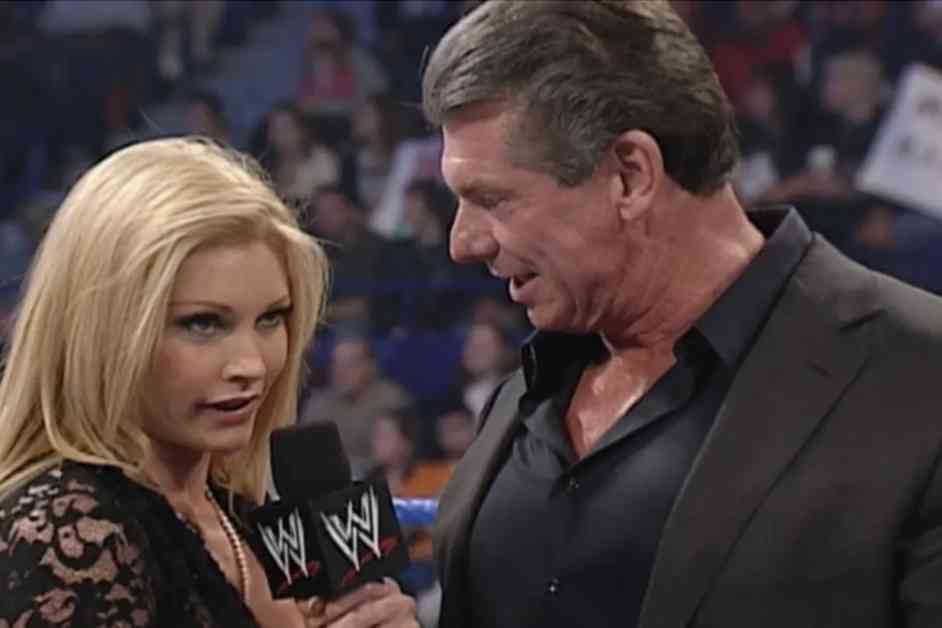Vince McMahon, the Chairman of WWE, has recently denied recollection of certain controversial events involving former WWE superstar Sable. In 1999, Sable, whose real name is Rena Marlette Lesnar, filed a $110 million lawsuit against the WWE, alleging sexual harassment and unsafe working conditions during her time with the company. This legal battle shed light on the treatment of female performers in the wrestling industry, particularly in the late 90s when women were often objectified and utilized primarily for their looks rather than their wrestling abilities.
Sable, known for her provocative persona and appearances in bikini contests and “eye candy” segments, was a prominent figure in WWE during her tenure. The lawsuit brought attention to the challenges faced by female wrestlers in a male-dominated industry, where they were sometimes subjected to inappropriate behavior and unequal treatment. Despite the lawsuit, Sable and WWE reached a settlement out of court in August 1999, allowing both parties to move on from the contentious legal dispute.
When asked about his memory of the lawsuit and the allegations made by Sable, Vince McMahon responded with a surprising lack of recollection. In an interview on “Mr. McMahon,” McMahon stated, “I don’t remember much about Sable in terms of the lawsuit.” When pressed further about the allegations, he simply replied, “No, I don’t. It’s kind of a blur. All I know is she came back to work, so….” This response has raised eyebrows among fans and critics, as the lawsuit was a significant event in WWE’s history and had a lasting impact on the company’s approach to handling talent relations and workplace conduct.
Despite the legal troubles and controversy surrounding Sable’s departure from WWE, she eventually returned to the company in 2003. During her second stint with WWE, Sable was involved in an on-screen affair with none other than Vince McMahon himself. When reminded of this storyline during the “Mr. McMahon” interview, McMahon seemed taken aback, asking, “With who?” After being informed that the on-screen affair was with Sable, McMahon jokingly responded, “Me? [Laughs]. God.” This playful exchange highlighted the sometimes bizarre and boundary-pushing nature of WWE storylines, where real-life drama and personal relationships were often incorporated into scripted entertainment.
In a separate incident from 2001, Vince McMahon made headlines when he admitted in an interview with Playboy that he had engaged in multiple affairs. When questioned about whether these personal experiences influenced the storylines and characters in WWE programming, McMahon was quick to dismiss any connection, stating that they were “totally unrelated.” This revelation added another layer of complexity to McMahon’s public persona, showcasing the blurred lines between reality and fiction in the world of professional wrestling.
More recently, in January of this year, a former WWE employee named Janel Grant filed a lawsuit against Vince McMahon, WWE, and John Laurinaitis, alleging sexual assault and sex trafficking by McMahon. The lawsuit reignited discussions about misconduct and abuse of power within the wrestling industry, prompting a federal investigation into the claims. On May 30, Grant agreed to pause the lawsuit for six months to allow the investigation to proceed, leading to McMahon’s resignation from TKO/WWE in the wake of the controversy.
The allegations made by Sable and Janel Grant shed light on the challenges faced by women in the wrestling industry and the need for greater accountability and transparency in addressing issues of harassment and abuse. As the industry continues to evolve and adapt to changing social norms, it is crucial for companies like WWE to prioritize the safety and well-being of their talent and employees. By acknowledging past mistakes and taking proactive measures to prevent future misconduct, organizations can create a more inclusive and respectful environment for all individuals involved in the world of professional wrestling.
Conclusion
In conclusion, the denials and responses from Vince McMahon regarding the Sable lawsuit and on-screen affair have sparked renewed interest in the treatment of female performers in WWE and the broader wrestling industry. The legal battles and controversies surrounding Sable and Janel Grant have highlighted the need for greater awareness and accountability when it comes to issues of harassment and abuse. Moving forward, it is essential for companies like WWE to prioritize the well-being of their talent and employees, creating a safe and respectful environment for all individuals involved in the world of professional wrestling. Only by addressing these challenges head-on can the industry truly evolve and foster a culture of equality and respect for all.

